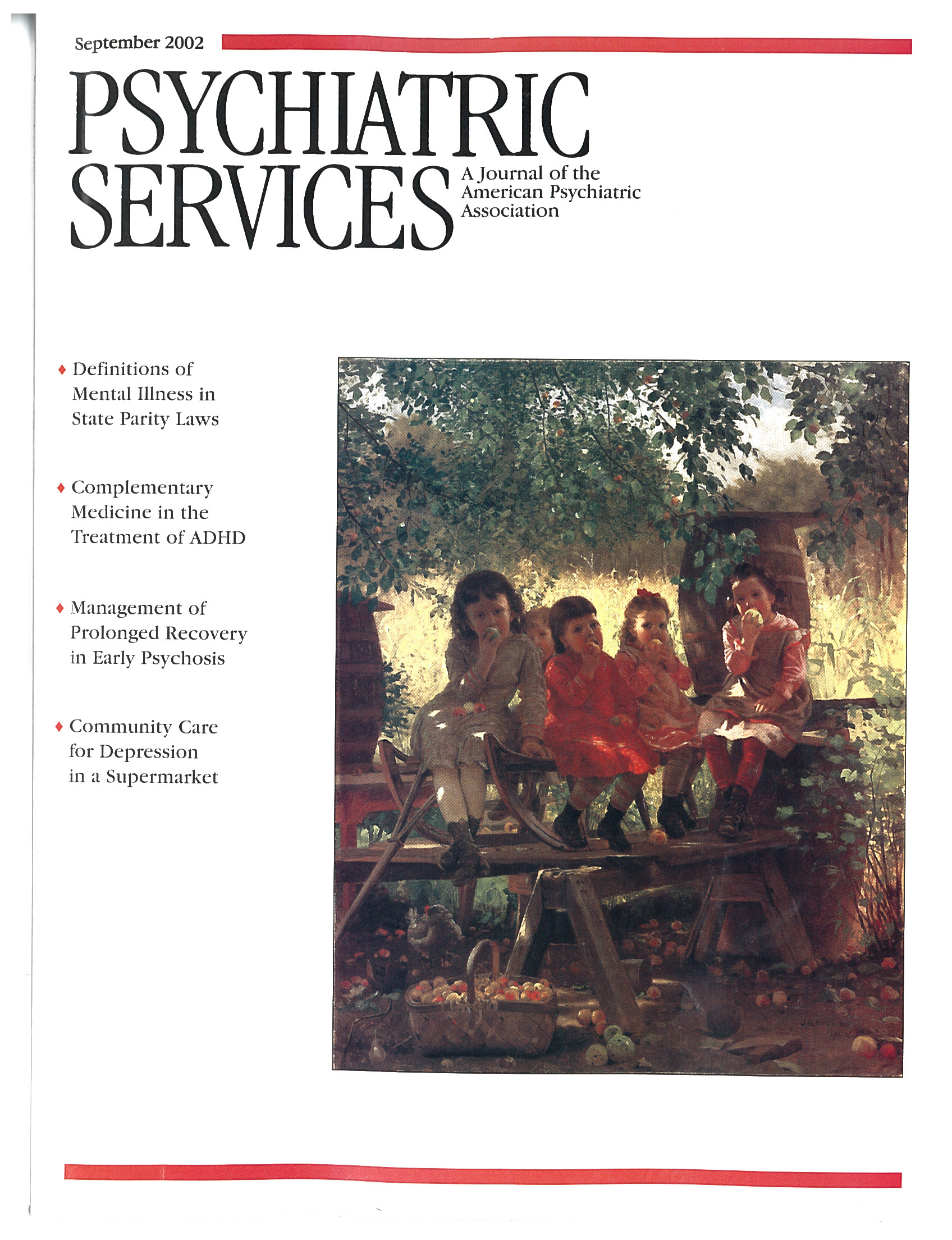Patients' Attitudes Toward Antidepressants
To the Editor: The efficacy and tolerability of an antidepressant medication are not determined solely by the drug's pharmacological potency. An intricate interaction of factors, including the doctor-patient relationship and the patient's attitude toward his or her illness and toward prescription medications, influences outcome.
In the study reported here, stable depressed patients who were adherent to medication regimens and who were attending the outpatient clinic of a psychiatric hospital in the Netherlands in 1999 were asked to complete a questionnaire about their attitudes toward taking medications and to give the questionnaire to their therapist or return it by mail. Items in the questionnaire were based on studies of factors involved in treatment compliance (1,2). The decision to prescribe antidepressant medication was made by each patient's therapist. Written informed consent was obtained from all patients before they completed the questionnaire.
Of the 301 patients who were given the questionnaire, 233 (77 percent) returned it. The sociodemographic and diagnostic characteristics of the respondents did not differ from those of nonrespondents. The respondents' mean±SD age was 49.4±22.6 years. Seventy-eight of the respondents (33 percent) were male, and 155 were female. The primary diagnoses of the respondents were major depression (126 patients, or 54 percent), dysthymia (23 patients, or 10 percent), bipolar disorder (16 patients, or 7 percent), anxiety (37 patients, or 16 percent), and other diagnoses (22 patients, or 13 percent).
A total of 192 patients (82 percent) had been taking an antidepressant medication for more than six months. These patients were asked whether they agreed with 12 statements about antidepressants. Seventy patients (30 percent) said they believe that antidepressants are addictive. A total of 99 (43 percent) said they believe that taking them makes people dependent on their doctor. Seventy patients (30 percent) expressed a belief that a person who starts taking antidepressants can never stop using them. Sixty-eight patients (29 percent) said that taking an antidepressant prevents people from doing the things that they could do to feel better on their own. Forty patients (17 percent) said they believe that taking antidepressants is a sign of weakness. A total of 174 (75 percent) said that the medication gives them courage.
A total of 162 of the respondents (70 percent) said they believe that antidepressant medications do not really solve a person's problems, whereas 203 patients (87 percent) agreed with the statement "They help me, because as I feel better, they help me to tackle my problems." Forty-one (18 percent) expressed a belief that the medication suppresses their problems. Sixty-one patients (27 percent) endorsed the item "It is better to solve your own problems than to use antidepressants." Sixty-six (28 percent) said that taking a medication makes them feel like a psychiatric patient. A total of 174 patients (75 percent) said they believe that using an antidepressant is similar to using a medication for diabetes.
A total of 184 patients (79 percent) reported that they received information about antidepressants before beginning treatment. Eighty-two (35 percent) stated that their partner was present when the information was provided, and 135 (58 percent) said they believe that it is very important that a partner be present when such information is provided. Fifteen patients (6 percent) reported that they did not feel supported by their partner in their decision to use an antidepressant. Sixty-four (27 percent) reported a lack of such support from their family, and 71 (31 percent) from their friends.
A total of 152 patients (65 percent) said that they knew other people who were using antidepressants. However, only 17 (7 percent) thought that this was a reason to use medication themselves.
Limitations of the study are that the severity of each patient's disorder was not assessed and that medication compliance was not examined. However, the results show that even in a group of long-term users of antidepressants, negative attitudes toward these medications persist. Some respondents' beliefs raise particular concerns: that antidepressants are addictive, that taking them leads to dependence on the clinician, that once people begin using antidepressants they can never stop, that taking these medications prevents people from taking steps to get better on their own, and that taking them does not really solve problems. Further research is needed to identify negative attitudes toward antidepressants that contribute to noncompliance.
Clinicians who prescribe antidepressants and those who develop psychoeducational programs may find the results of this survey useful. Involvement of a patient's partner may be an important factor in ensuring treatment compliance. Clinicians should explore a patient's perceptions of the extent of support provided by significant others and the role that such support plays in the patient's acceptance of antidepressants.
The authors are affiliated with the Parnassia Psychiatric-Medical Center in The Hague, Netherlands.
1. Demyttenaere K: Noncompliance with antidepressants: who's to blame? International Clinical Psychopharmacology 13 (suppl): S19-25, 1998Google Scholar
2. Scott AJ: Predicting medication adherence in severe mental disorders. Acta Psychiatrica Scandinavica 101:119-124, 2002Google Scholar



